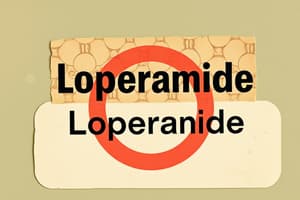Podcast
Questions and Answers
What are Antidiarrheal Drugs?
What are Antidiarrheal Drugs?
Used to treat diarrhea, classified into two groups: nonspecific antidiarrheal agents and specific antidiarrheal agents.
What are the two major groups of Antidiarrheal Drugs?
What are the two major groups of Antidiarrheal Drugs?
Nonspecific antidiarrheal agents and specific antidiarrheal agents.
What is Atropine used for?
What is Atropine used for?
It is used for bradycardia but also slows gastrointestinal motility to help treat diarrhea.
What is Diphenoxylate (Lomotil) and what is it combined with?
What is Diphenoxylate (Lomotil) and what is it combined with?
What are the side effects of Diphenoxylate (Lomotil)?
What are the side effects of Diphenoxylate (Lomotil)?
What is Loperamide (Imodium)?
What is Loperamide (Imodium)?
What are the nursing considerations for Antidiarrheal Agents?
What are the nursing considerations for Antidiarrheal Agents?
What are Antidiarrheal Drugs: Anticholinergics?
What are Antidiarrheal Drugs: Anticholinergics?
What is IBS and what drugs treat diarrhea and constipation associated with it?
What is IBS and what drugs treat diarrhea and constipation associated with it?
What is Alosetron (Lotronex)?
What is Alosetron (Lotronex)?
What is Sulfasalazine (Meridia) used for?
What is Sulfasalazine (Meridia) used for?
Flashcards
Nonspecific antidiarrheal agents
Nonspecific antidiarrheal agents
These medications work by slowing down the movement of the digestive system, which gives the body more time to absorb fluids and electrolytes.
Specific antidiarrheal agents
Specific antidiarrheal agents
These medications specifically target the underlying cause of diarrhea, like an infection.
Diphenoxylate (Lomotil)
Diphenoxylate (Lomotil)
This medication is an opioid antidiarrheal that works by activating opioid receptors in the gut, slowing down the movement of food and fluids.
Loperamide (Imodium)
Loperamide (Imodium)
Signup and view all the flashcards
Anticholinergic Antidiarrheal Drugs
Anticholinergic Antidiarrheal Drugs
Signup and view all the flashcards
Irritable Bowel Syndrome (IBS)
Irritable Bowel Syndrome (IBS)
Signup and view all the flashcards
Alosetron (Lotronex)
Alosetron (Lotronex)
Signup and view all the flashcards
Sulfasalazine (Meridia)
Sulfasalazine (Meridia)
Signup and view all the flashcards
Atropine
Atropine
Signup and view all the flashcards
Alosetron (Lotronex)
Alosetron (Lotronex)
Signup and view all the flashcards
Sulfasalazine (Meridia)
Sulfasalazine (Meridia)
Signup and view all the flashcards
Study Notes
Antidiarrheal Drugs Overview
- Antidiarrheal drugs are medications used to alleviate diarrhea symptoms.
- Two primary categories:
- Nonspecific antidiarrheal agents: Includes opioids and anticholinergic antispasmodics.
- Specific antidiarrheal agents: Target underlying causes, such as anti-infective medications for infections like C. difficile.
Atropine
- Atropine treats bradycardia and also reduces gastrointestinal (GI) motility to help manage diarrhea.
Diphenoxylate (Lomotil)
- Opioid antidiarrheal that activates opioid receptors in the GI tract, reducing motility and increasing absorption time for fluids/electrolytes.
- Contains atropine to mitigate potential abuse and categorized as a Schedule V controlled substance.
- Side effects include sedation and anticholinergic effects (dry mouth, urinary retention); should not be administered to children under 2 years.
- Available in tablets and oral liquid formulations.
Loperamide (Imodium)
- Similar to opioids, no controlled substance classification.
- Structural analog of meperidine; maximum dosing should not exceed 16mg/day.
- Should not be used for more than 48 hours to prevent CNS toxicity.
Nursing Considerations for Antidiarrheal Agents
- Avoid operating vehicles or machinery post-administration due to potential hypotension effects.
- Advise gradual position changes to prevent dizziness.
- Encourage hydration and management of dry mouth with hard candy or gum.
- Recommend urination every 4 hours, with attention to urinary retention.
Anticholinergic Antidiarrheal Drugs
- Mainly employed to reduce GI tract motility; atropine is a key drug.
- High doses should be avoided to prevent bradycardia; intended for acute diarrhea management.
Irritable Bowel Syndrome (IBS)
- Characterized by chronic discomfort involving cramps and alternating diarrhea/constipation.
- IBS-D is treated with alosetron; IBS-C with lubiprostone.
- Frequency of IBS consultations is high, often due to unclear treatment pathways.
Alosetron (Lotronex)
- Specifically approved for use in women with severe IBS-D lasting over 6 months and previously unresponsive to other treatments.
- High-risk medication associated with severe side effects like constipation and potential complications (e.g., ischemic colitis).
- Requires patient-physician agreement due to toxicity risks and advises reporting severe abdominal pain or rectal bleeding.
Sulfasalazine (Meridia)
- Indicated for inflammatory bowel disease (IBD), including Crohn's disease and ulcerative colitis.
- Acts as an antibiotic, decreasing inflammation through inhibiting prostaglandin synthesis.
- Administered orally with food to minimize GI upset; may cause orange-yellow urine.
- Nursing considerations include contraindications for patients with salicylate/sulfonamide allergies and potential adverse effects like bone marrow suppression.
Studying That Suits You
Use AI to generate personalized quizzes and flashcards to suit your learning preferences.




